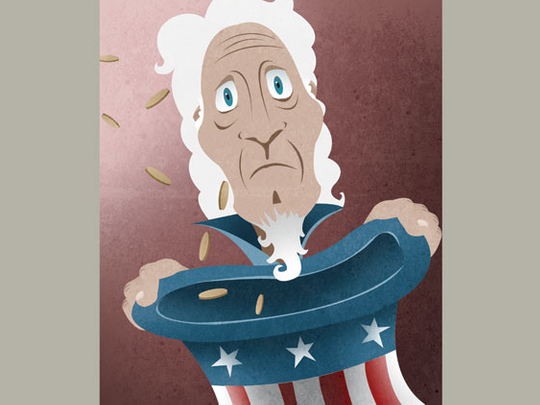
A lot of conservatives are puzzled that polls show the presidential election is even close, let alone that most show Barack Obama ahead. So convinced are they that Obama has failed that they think he ought to be out of the running.
This mystery is leading an increasing number of conservatives to adopt a depressing theory about the future of our country — a theory that is fortunately false.
John Hinderaker, who writes for the conservative blog Power Line, expressed it in a recent post: “On paper, given Obama’s record, this election should be a cakewalk for the Republicans. Why isn’t it? I am afraid the answer may be that the country is closer to the point of no return than most of us believed.”
He continued: “With over 100 million Americans receiving federal welfare benefits, millions more going on Social Security disability, and many millions on top of that living on entitlement programmes — not to mention enormous numbers of public employees — we may have gotten to the point where the government economy is more important, in the short term, than the real economy.”
This explanation fits into a long tradition of conservative scepticism about democracy. The underlying idea is that the more people rely on the federal government, the more they will support government activism and the party that favours it. Whatever one thinks of that activism, it’s a plausible idea — just as it’s plausible, though Republicans never say it, that defence spending might promote an unhealthy interest in the defence budget among the Americans who benefit directly from it.
Close to tipping point
More recently, many conservatives have expressed worry that the growth in the percentage of Americans who pay no federal income tax will make the electorate more supportive of big government. Paul Ryan said as much after a speech at the Heritage Foundation last year: “We’re coming close to a tipping point in America where we might have a net majority of takers versus makers in society and that could become very dangerous if it sets in as a permanent condition.”
As an explanation for electoral trends, though, this theory doesn’t hold up.
One major reason for the growth of the federal government in recent years has been that entitlement spending per beneficiary has increased, and so has the number of beneficiaries as people have retired. Yet senior citizens — who benefit from federal programmes, on average, far more than younger people — have become more Republican over that same period. They actually voted for John McCain over Obama in 2008 by a slightly higher margin than they did for George W. Bush over John Kerry in 2004.
In 2010, their Republican margin increased even more, to a whopping 21 points. Pollster Scott Rasmussen told me that in his latest poll, Romney still leads among seniors by 19 points.
It’s true that Americans with low incomes — more and more of whom now receive food stamps and federally subsidised health insurance — have generally voted for Democrats over Republicans. But in 2010, these voters shifted toward Republicans even as food stamps, unemployment benefits and the like continued to increase.
Tax credit
Conservatives have even less reason for worrying about people who don’t pay federal income taxes. A major reason that the number of those people has grown is that a Republican-controlled Congress created, and the Bush administration expanded, a tax credit for parents. If there is any evidence that in recent years middle-class parents have become more Democratic, relative to the general electorate, I haven’t seen it.
So why is Obama doing so well in the polls, if increased public dependency on government isn’t the answer?
For starters, the public at large isn’t as convinced as conservatives that he has been a dismal failure. Most people cut him some slack because of the economic crisis that began under a Republican president and kept unfolding as Obama took office. They know that the economy has changed direction. Some people think the economy has done about as well as it could have under the circumstances.
Another reason Obama is doing well might have to do with the weakness of the Republican economic message. Republicans dwell on the heroic entrepreneur held back by taxes and regulation, which must be part of the story that a free-market party tells. But most people don’t see themselves in that storyline, any more than they see themselves as dependents of the federal government. They don’t see Americans as divided between makers and takers.
To the extent Republicans do, they’re handicapping themselves.












